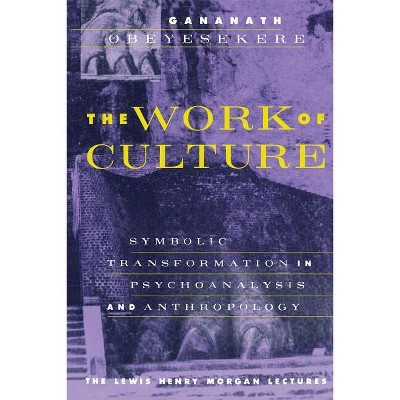Sponsored

Marginal Gains - (Lewis Henry Morgan Lecture) by Jane I Guyer (Paperback)
$30.00
In Stock
Eligible for registries and wish lists
Sponsored
About this item
Highlights
- In America, almost all the money in circulation passes through financial institutions every day.
- About the Author: Jane I. Guyer is a professor of anthropology at Johns Hopkins University.
- 232 Pages
- Social Science, Anthropology
- Series Name: Lewis Henry Morgan Lecture
Description
Book Synopsis
In America, almost all the money in circulation passes through financial institutions every day. But in Nigeria's "cash and carry" system, 90 percent of the currency never comes back to a bank after it's issued. What happens when two such radically different economies meet and mingle, as they have for centuries in Atlantic Africa? The answer is a rich diversity of economic practices responsive to both local and global circumstances. In Marginal Gains, Jane I. Guyer explores and explains these often bewildering practices, including trade with coastal capitalism and across indigenous currency zones, and within the modern popular economy. Drawing on a wide range of evidence, Guyer demonstrates that the region shares a coherent, if loosely knit, commercial culture. She shows how that culture actually works in daily practice, addressing both its differing scales of value and the many settings in which it operates, from crisis conditions to ordinary household budgets. The result is a landmark study that reveals not just how popular economic systems work in Africa, but possibly elsewhere in the Third World.From the Back Cover
In America, almost all the money in circulation passes through financial institutions every day. But in Nigeria's "cash and carry" system, 90 percent of the currency never comes back to a bank after it's issued. What happens when two such radically different economies meet and mingle, as they have for centuries in Atlantic Africa? The answer is a rich diversity of economic practices responsive to both local and global circumstances. In Marginal Gains, Jane I. Guyer explores and explains these often bewildering practices, including trade with coastal capitalism and across indigenous currency zones, and within the modern popular economy. Drawing on a wide range of evidence, Guyer demonstrates that the region shares a coherent, if loosely knit, commercial culture. She shows how that culture actually works in daily practice, addressing both its differing scales of value and the many settings in which it operates, from crisis conditions to ordinary household budgets. The result is a landmark study that reveals not just how popular economic systems work in Africa, but possibly elsewhere in the Third World.About the Author
Jane I. Guyer is a professor of anthropology at Johns Hopkins University. She is the author, most recently, of An African Niche Economy: Farming to Feed Ibadan and Money Matters: Instability, Values, and Social Payments in the Modern History of West African Communities.Dimensions (Overall): 9.0 Inches (H) x 6.1 Inches (W) x .6 Inches (D)
Weight: .7 Pounds
Suggested Age: 22 Years and Up
Number of Pages: 232
Genre: Social Science
Sub-Genre: Anthropology
Series Title: Lewis Henry Morgan Lecture
Publisher: University of Chicago Press
Theme: Physical
Format: Paperback
Author: Jane I Guyer
Language: English
Street Date: March 1, 2004
TCIN: 1006090729
UPC: 9780226311166
Item Number (DPCI): 247-18-7592
Origin: Made in the USA or Imported
If the item details aren’t accurate or complete, we want to know about it.
Shipping details
Estimated ship dimensions: 0.6 inches length x 6.1 inches width x 9 inches height
Estimated ship weight: 0.7 pounds
We regret that this item cannot be shipped to PO Boxes.
This item cannot be shipped to the following locations: American Samoa (see also separate entry under AS), Guam (see also separate entry under GU), Northern Mariana Islands, Puerto Rico (see also separate entry under PR), United States Minor Outlying Islands, Virgin Islands, U.S., APO/FPO
Return details
This item can be returned to any Target store or Target.com.
This item must be returned within 90 days of the date it was purchased in store, shipped, delivered by a Shipt shopper, or made ready for pickup.
See the return policy for complete information.
Trending Non-Fiction


Highly rated
$19.31
was $20.98 New lower price
Buy 2, get 1 free select books
4.1 out of 5 stars with 54 ratings

$19.58
MSRP $29.00
Buy 2, get 1 free select books
4.7 out of 5 stars with 11 ratings

$4.59
MSRP $7.99
Buy 2, get 1 free select books
4.8 out of 5 stars with 117 ratings

$6.20
MSRP $10.95
Buy 2, get 1 free select books
4.8 out of 5 stars with 33 ratings

$7.09
MSRP $9.99
Buy 2, get 1 free select books
4.9 out of 5 stars with 45 ratings





